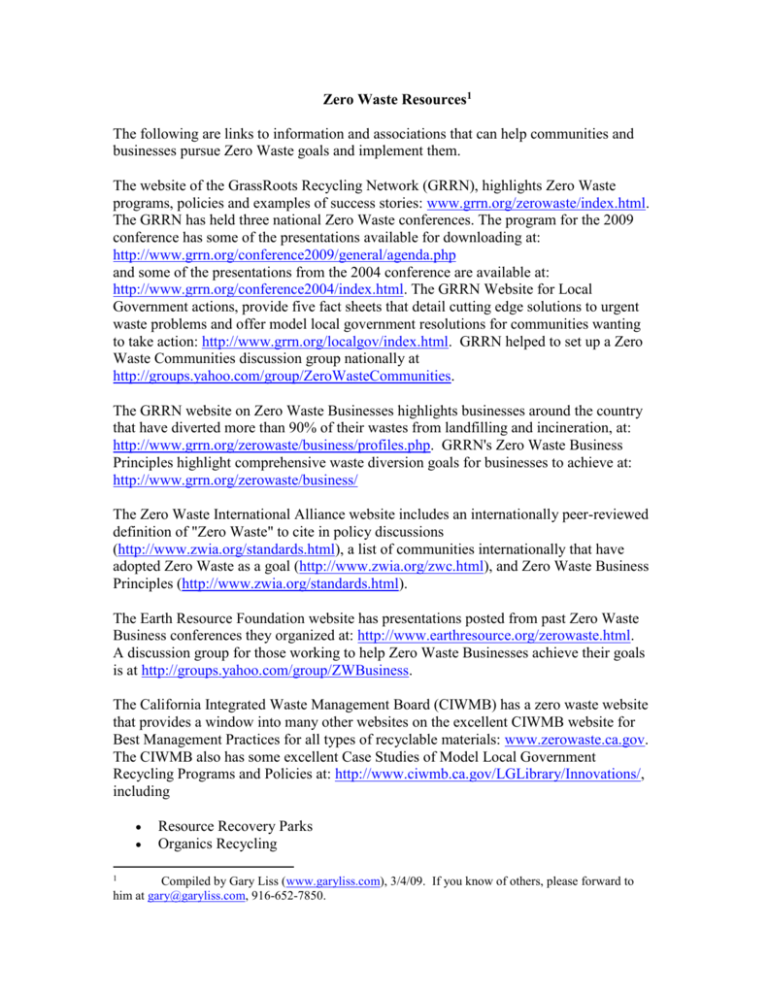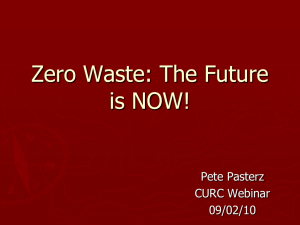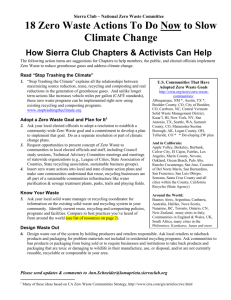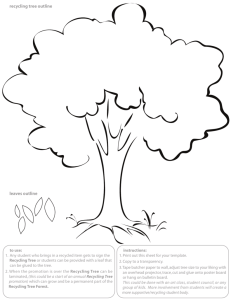Zero Waste Resources
advertisement

Zero Waste Resources1 The following are links to information and associations that can help communities and businesses pursue Zero Waste goals and implement them. The website of the GrassRoots Recycling Network (GRRN), highlights Zero Waste programs, policies and examples of success stories: www.grrn.org/zerowaste/index.html. The GRRN has held three national Zero Waste conferences. The program for the 2009 conference has some of the presentations available for downloading at: http://www.grrn.org/conference2009/general/agenda.php and some of the presentations from the 2004 conference are available at: http://www.grrn.org/conference2004/index.html. The GRRN Website for Local Government actions, provide five fact sheets that detail cutting edge solutions to urgent waste problems and offer model local government resolutions for communities wanting to take action: http://www.grrn.org/localgov/index.html. GRRN helped to set up a Zero Waste Communities discussion group nationally at http://groups.yahoo.com/group/ZeroWasteCommunities. The GRRN website on Zero Waste Businesses highlights businesses around the country that have diverted more than 90% of their wastes from landfilling and incineration, at: http://www.grrn.org/zerowaste/business/profiles.php. GRRN's Zero Waste Business Principles highlight comprehensive waste diversion goals for businesses to achieve at: http://www.grrn.org/zerowaste/business/ The Zero Waste International Alliance website includes an internationally peer-reviewed definition of "Zero Waste" to cite in policy discussions (http://www.zwia.org/standards.html), a list of communities internationally that have adopted Zero Waste as a goal (http://www.zwia.org/zwc.html), and Zero Waste Business Principles (http://www.zwia.org/standards.html). The Earth Resource Foundation website has presentations posted from past Zero Waste Business conferences they organized at: http://www.earthresource.org/zerowaste.html. A discussion group for those working to help Zero Waste Businesses achieve their goals is at http://groups.yahoo.com/group/ZWBusiness. The California Integrated Waste Management Board (CIWMB) has a zero waste website that provides a window into many other websites on the excellent CIWMB website for Best Management Practices for all types of recyclable materials: www.zerowaste.ca.gov. The CIWMB also has some excellent Case Studies of Model Local Government Recycling Programs and Policies at: http://www.ciwmb.ca.gov/LGLibrary/Innovations/, including 1 Resource Recovery Parks Organics Recycling Compiled by Gary Liss (www.garyliss.com), 3/4/09. If you know of others, please forward to him at gary@garyliss.com, 916-652-7850. C&D Policies Business Recycling Policies and Programs Incentives for Maximizing Waste Diversion The CIWMB reference library includes materials that have been submitted to CIWMB by local jurisdictions, including such documents as regional agency agreements, joint powers agreements, memoranda of understanding, solid waste ordinances, public education materials, and petitions for reduction in diversion mandates: http://www.ciwmb.ca.gov/LGLibrary/LocalDocs/ Resourceful Communities: A guide to Resource Recovery Centres in New Zealand (PDF 1.8 MB) provides some good insights and models for developing Resource Recovery Parks as well: http://www.zerowaste.co.nz/assets/Reports/ResourcefulCommunitieslowres.pdf EPA Website on Resource Management which seeks to align waste contractor incentives with community or business goals to foster cost-effective resource efficiency through prevention, recycling, and recovery: http://www.epa.gov/osw/partnerships/wastewise/wrr/rm.htm The website of the Institute for Local Self-Reliance (ILSR), Wasting and Recycling in the U.S., 2000 is a comprehensive overview of facts and figures on those topics, available at: http://www.ilsr.org/recycling/zerowaste/index.html. ILSR also produced an excellent publication, "Cutting the Waste Stream in Half: Community Record-Setters Show How" providing detailed costs and descriptions of communities that diverted more than 50% of their waste from landfill: http://www.ilsr.org/pubs/cuttingwaste.pdf. ILSR also has other excellent related publications on their website, at www.ilsr.org/recycling/. A White Paper was prepared for the International Dialog on Proper Discard Management organized by the CRRA Global Recycling Council (GRC), August 26-27, 2004. This White Paper highlights key issues and opportunities for communities seeking to conserve wastes as resources: http://www.crra.com/grc/international/whitepaper.html. In addition, presentations by many of the speakers at the GRC International Dialog are posted at: http://www.crra.com/grc/international/index.html. GRC also has posted a variety of articles and publications on Zero Waste at: www.crra.com/grc/articles/zwc.html The CA Product Stewardship Council was established to provide a voice for local governments to articulate the need for more producer responsibility for their products and packages. This website has excellent background information on the subject, model powerpoint presentations, sample local ordinances, information on how to join at: www.calpsc.org. The Computer TakeBack Campaign works to protect the health and well being of electronics users, workers, and the communities where electronics are produced and discarded by requiring consumer electronics manufacturers and brand owners to take full responsibility for the life cycle of their products, through effective public policy requirements or enforceable agreements: http://www.computertakeback.com/ Clean Production Action works with groups around the world to develop and build technical support for policies and strategies that promote the use of products that are safer and cleaner across their life cycle for consumers, workers and communities: http://www.cleanproduction.org/AAbase/default.htm The U.S. Green Building Council is the nations foremost coalition of leaders from across the building industry working to promote buildings that are environmentally responsible, profitable and healthy places to live and work: http://www.usgbc.org/AboutUs/mission_facts.asp The Zero Waste New Zealand Trust website includes an excellent manual on Zero Waste Community Planning (Getting there! The Road to Zero Waste (PDF 1.4 MB) http://www.zerowaste.co.nz/assets/Reports/roadtozerowaste150dpi.pdf). Their goal is to help create a worldwide movement of local governments to achieve tangible improvements in global sustainability with special focus on environmental conditions through cumulative local actions at: http://www.zerowaste.co.nz/. ICLEI offers Local Authorities an online self-assessment tool for local sustainable development processes. You can use this tool free of charge to evaluate processes and progress towards sustainable development from a local authority perspective: http://www.localevaluation21.org/ The USEPA conducted a groundbreaking study of the nation's recycling and reuse industry, called the National Recycling Economic Information Project. This website the number of jobs created and the value of the recycling and reuse industry, and provides tools to apply this information to promote recycling efforts in your area: http://www.epa.gov/jtr/econ/rei-rw/rei-rw.htm The USEPA has also developed extensive analyses of the links between Zero Waste and Global Warming at: http://epa.gov/climatechange/wycd/waste/index.html and http://www.epa.gov/wastewise/pubs/howto.pdf. They also have a great list of global warming calculators at: http://yosemite.epa.gov/oar/globalwarming.nsf/content/ActionsWasteTools.html. The WARM model is most often cited as the basis for calculating local communities impacts on climate change, at: http://yosemite.epa.gov/oar/globalwarming.nsf/content/ActionsWasteWARMUsersGuide .html L.A. SHARES, which operates the Materials For The Arts Program, is a non-profit materials reuse program that takes donations of reusable goods and materials (both new and used) from the local business community and redistributes these items FREE-OFCHARGE to non-profits and schools throughout Los Angeles County: http://www.lashares.org/mfa/ The Center for a Competitive Waste Industry champions efforts to restore and maintain competition in the solid waste industry: http://www.competitivewaste.org/ Zero Waste Community Plans have been adopted to guide communities in the development of new policies, programs and facilities to achieve Zero Waste. Examples of Plans that have been adopted include: the City of Austin, TX Zero Waste Strategic Plan: http://www.ci.austin.tx.us/sws/downloads/VeryFinalZWPlan.pdf the City of Oakland, CA Zero Waste Strategic Plan: http://www.zerowasteoakland.com/AssetFactory.aspx?did=2123 the City of Palo Alto, CA Zero Waste Strategic Plan: http://www.cityofpaloalto.org/civica/filebank/blobdload.asp?BlobID=7100 the City of San Jose, CA Zero Waste Plan: http://www.sjrecycles.org/zerowaste-stratplan.asp the Telluride, CO Zero Waste Plan: http://www.newcommunitycoalition.org/documents/ZeroWasteActionPlan.pdf the Burbank, CA Zero Waste Plan: http://www.ci.burbank.ca.us/Modules/ShowDocument.aspx?documentid=3117 the County of Hawai’i Zero Waste Plan: http://compostingconsultant.com/images2/hawaii-zero-waste-plan.pdf the website for Zero Waste Planning in the City of Los Angeles, CA: http://www.zerowaste.lacity.org/home/index.html the Central Vermont Waste Management District Zero Waste Plan: http://www.cvswmd.org/wp/category/for-member-towns/swip/ and the City of Nelson, British Columbia Zero Waste Action Plan: http://www.city.nelson.bc.ca/pdf/zero_waste.pdf. Austin, Oakland and Palo Alto used their website throughout the development of their plans, so you can see all the steps taken to develop those plans, and subsequent updates, at their Zero Waste websites: Austin, TX Zero Waste website: http://www.ci.austin.tx.us/sws/0waste.htm Oakland, CA Zero Waste website: http://www.zerowasteoakland.com/Page749.aspx and Palo Alto, CA Zero Waste Website: http://www.cityofpaloalto.org/depts/pwd/recycle/zero_waste_program.asp Many communities are including Zero Waste goals in Climate Action Plans or Sustainability Plans, such as the following: Burbank Sustainability Plan: http://www.ci.burbank.ca.us/PublicWorks/Sustainability/Sustainability.htm Austin Climate Protection Plan: http://www.ci.austin.tx.us/acpp/downloads/acpplan_overview.pdf San Miguel County (including Telluride and Mountain Village) Sustainability Action Plan 2007: http://www.naco.org/cffiles/ggi/green_counties/documents/San%20Miguel%20County% 20CO%20Sustainability%20Action%20Plan.pdf Designing City Contracts and RFPs for Zero Waste (CRRA 2008): http://www.crra.com/2008conf/presentations/monday/monday_liss.ppt The UN has adopted Urban Environmental Accords which is the only “Cool Cities” program that includes Zero Waste as one of its Accords. These were adopted by over 100 communities in response to a challenge from the City of San Francisco to the 100 largest communities on earth to adopt them, as part of World Environment Day in 2005 in San Francisco. For a copy of the Accords, go to: http://www.sfenvironment.org/our_policies/overview.html?ssi=15 The Zero Waste Task Force of Santa Clara, San Mateo and San Benito counties worked to draft a Zero Waste Communities Strategy to help communities on how to create a Zero Waste Community: http://www.crra.com/grc/articles/zwc.html A sample Zero Waste Communities Slide Show that was presented to the Palo Alto Zero Waste Task Force on February 10, 2005 highlights the opportunities for adopting Zero Waste as a goal by communities: http://www.crra.com/grc/articles/zwcpaloalto/zwcpalotalto_files/frame.htm A Zero Waste Tool Kit For Local Government was prepared by the Recycling Council of British Columbia (May 2002): http://www.footprintbc.com/zerowastenorth/pdf/gov/Zero_Waste_Local_Gov_Kit.pdf A Citizens's Guide to Zero Waste, was prepared in 2001 by Bill Sheehan and Paul Connett (PDF 164 KB): http://www.zerowaste.co.nz/assets/Reports/CitizensGuide.pdf Fortune magazine had an excellent article on Zero Waste in 2007: http://money.cnn.com/magazines/fortune/fortune_archive/2007/03/19/8402369/index.htm Eco-Cycle in Boulder Colorado is working to develop their community into a model for Zero Waste implementation. They have an excellent 6 minute video that makes a great introduction to a Zero Waste talk (http://www.eco-cycle.org/zerowastevideo/index.cfm), and other resources at their Zero Waste webpage at: http://www.eco-cycle.org/zero/index.cfm Californians Against Waste (CAW) is leading the fight for new rules and legislation to help develop Zero Waste in the future. Some of those are highlighted at their Zero Waste webpage: http://www.cawrecycles.org/issues/zero_waste Here are some links to related Yahoo Groups: Zero Waste Communities - This group will help communities working to adopt and implement Zero Waste as a goal by sharing information and resources. This group was organized by the Zero Waste Communities Work Group of the GrassRoots Recycling Network (www.grrn.org). This group adheres to the definition of Zero Waste adopted by the Zero Waste International Alliance (www.zwia.org). To join, go to: http://groups.yahoo.com/group/ZeroWasteCommunities/ A discussion group for those working to help Zero Waste Businesses achieve their goals is at http://groups.yahoo.com/group/ZWBusiness. Plastic Debris: Rivers to Sea - This network is an information exchange and dialogue seeking an understanding of and solutions to the problems associated with plastic and trash in the marine environment. http://groups.yahoo.com/group/plasticdebris/?yguid=32640534 To join, email: plasticdebris-subscribe@yahoogroups.com








![School [recycling, compost, or waste reduction] case study](http://s3.studylib.net/store/data/005898792_1-08f8f34cac7a57869e865e0c3646f10a-300x300.png)